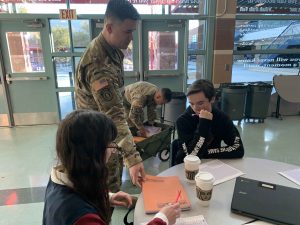By Oliver Van Aken

As college tuition prices rise every semester with out-of-state colleges charging an average of $40,940, more of America’s youth are denied higher education. High school is becoming a battleground for the best GPA, SAT/ACT scores and extracurriculars, all for the hope of getting into a college. However, alternatives are presented to students who may not want to follow the typical college route, and many businesses such as Google, Hilton, IBM and Apple don’t even require college degrees for employment.
Trade Schools
Trade schools, or vocational colleges, are best described as a modern-day apprenticeship. They train an individual in a particular technical skill such as plumbing, carpentry or welding under the wing of experienced professionals spanning anywhere from eight months to two years. Trade schools are located in cities across the country and are on average more cost-effective than the typical 4-year college.
Apprenticeships programs differ from trade schools, where students learn a trade while on the job site. Classes are held at local community colleges as well as wherever the students may be working. Apprenticeships use the money they earn on the job to pay for their classes and are also backed by the workers union for that particular skill.
“I am interested in going to a trade school because it offers me the chance to have my dream job as a mechanic,” sophomore Orr Jacobson said. “It also is affordable, and won’t put me deep into debt.”
Military Enlistment
Military enlistment is also an option for young men and women looking for secure employment straight out of high school. There are five branches to choose from: Air Force, Army, Marines, Navy and Coast Guard. However, people looking to recruit must serve a contract of at least four years of service.
Jobs in the military are determined off of the ASVAB, a test that’s content is primarily based on high school level education. The military can also train one in a specific job that would be high paying in the civilian world. These jobs range from nuclear engineering to underwater welding. If veterans are also interested in attending college, they may do so for free under the G.I. Bill.
“I wasn’t responsible enough at that age and felt as if I needed discipline so that is what I did,” history teacher Mr. Cucorillo said.
Community College
Although not entirely an alternative to college, going to community college in order to attain an associate’s degree helps in the workforce. Community colleges are often located near home, so students are able to work part-time while in school. Students limit their student debt and have more time to grow financially.
The College of Southern Nevada (CSN) also offers a certificate program that does not obligate students to go to school full-time. They can earn certificates needed for jobs such as auto-repair, phlebotomists, and EMT.
“Certificate programs might be helpful to students that are looking for other options, not wanting to go to school full-time,” counselor Mrs. Smyth said. “Yet, they can finish their certificate program and quite quickly have a job.”











